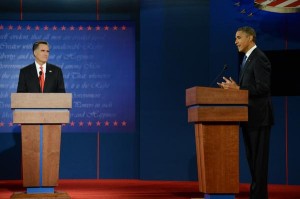Good morning, and welcome to another edition of Prix Fixe Politics! If Mitt Romney wins this election, it will be because of the way he turned the tide last night in Denver. It was Mitt’s Mile High Moment — a combination of a stinging critique of a suddenly meek President and a strong case for business-executive leadership. This debate won’t be remembered for any zingers or select lines. Simply put, it was Romney at his best and Obama at his worst for 90 minutes. We can now officially bear down for a dog fight until November 6th, but in the meantime here is today’s menu…
Appetizer: I watched the debate with 24 undecided swing voters in Lakewood, Colorado, thirteen having voted for Obama in 2008. Where did the group stand after the debate? 20 thought Romney won, and 10 said the debate made them more likely to vote for the challenger. Boston (Romney Headquarters) loves these numbers for several reasons. First, it’s serious earned media for the next week. With the next debate not until October 11 (and that’s between Joe Biden and Paul Ryan), last night’s contest will remain front and center for more than the typicl 48-hour news cycle. Second, it puts the President’s advisers on the defensive. They’ll be on CNN and MSNBC every day, trying to return the focus back to Romney’s rich, out-of-touch ways. Yet after their candidate got walloped like he did, any effort to pivot will come across as an admission of defeat. And third, it takes some of the pressure off Romney. He still has a lot to do in the next 32 days if he wants to be elected. But for a few days, he’ll get to spend more time talking about his success in Denver, which means less time talking about “The 47%” or tax returns.
 Main Course: There were a few moments in particular that stood out and are worth discussing. Romney’s opening statement where he set forth his five-point plan won high marks. You may have noticed in that clip, and many other times throughout the debate, Romney enumerated his points. Not only does that keep the communicator focused, but it causes the listener to think he’s hearing an organized, well-crafted answer. This style is one of the most important ways for Romney to appear to be giving the American people what they want to hear: SPECIFICS. While the President meandered through wordy answers and tired excuses, Romney enumerated his way to convincing voters that he does in fact have a plan. President Obama’s best moments came while discussing health care. Whether you hate or love Obamacare in sum, it’s hard to viscerally hate some of its component parts — 26 year olds, pre-existing conditions, etc. Romney and the Republicans still don’t have a good answer for the important question of what they’d do if they repeal Obamacare. Because Obama has set a new baseline with these well-liked components of the legislation, Romney must calibrate his plan accordingly. Finally, our Colorado swing voters were nearly off the charts with their real-time dials when Romney spoke about his bipartisanship in MA. In 2008, Obama promised to transcend partisanship. Four years later, the acrimony has gotten even worse and the public has grown increasingly impatient with the President and Congress. Romney has a record of working across the aisle, and the undecided voters notice it. With this debate answer, he gave his best introduction yet of himself as a Washington outsider with political skills desperately needed along Pennsylvania Avenue. That Obama let a Republican cast himself as the one best suited to working across the aisle is confounding.
Main Course: There were a few moments in particular that stood out and are worth discussing. Romney’s opening statement where he set forth his five-point plan won high marks. You may have noticed in that clip, and many other times throughout the debate, Romney enumerated his points. Not only does that keep the communicator focused, but it causes the listener to think he’s hearing an organized, well-crafted answer. This style is one of the most important ways for Romney to appear to be giving the American people what they want to hear: SPECIFICS. While the President meandered through wordy answers and tired excuses, Romney enumerated his way to convincing voters that he does in fact have a plan. President Obama’s best moments came while discussing health care. Whether you hate or love Obamacare in sum, it’s hard to viscerally hate some of its component parts — 26 year olds, pre-existing conditions, etc. Romney and the Republicans still don’t have a good answer for the important question of what they’d do if they repeal Obamacare. Because Obama has set a new baseline with these well-liked components of the legislation, Romney must calibrate his plan accordingly. Finally, our Colorado swing voters were nearly off the charts with their real-time dials when Romney spoke about his bipartisanship in MA. In 2008, Obama promised to transcend partisanship. Four years later, the acrimony has gotten even worse and the public has grown increasingly impatient with the President and Congress. Romney has a record of working across the aisle, and the undecided voters notice it. With this debate answer, he gave his best introduction yet of himself as a Washington outsider with political skills desperately needed along Pennsylvania Avenue. That Obama let a Republican cast himself as the one best suited to working across the aisle is confounding.
Dessert: Here are three pieces of advice for President Obama as he prepares for the next debate. First, figure out what you’re going to do with your head while Romney’s speaking. Looking down and disinterested like you did last night is the 2012 version of the smug, nose-up Obama we got in 2008. Unless you are writing something down, focus on Romney. And every time you give an answer, you should be looking directly into the camera. There’s no debate audience you need to pander to in the auditorium — the only important people are the ones watching at home! Your verbal shiftiness reflected a lack of self-confidence and your body language communicated defeat. Second, what happened to General Motors? You couldn’t swing a dead cat at the DNC without hitting an Obama surrogate talking about the success of GM. Heck, Biden’s best line from his DNC speech was: “Osama Bin Laden is dead, and General Motors is alive!” When you speak about “saving” GM, you are communicating directly with the voters of Ohio, Michigan, and Western Pennsylvania. Your ads in those states have been too good to start ceding ground there now. Third, where did Bain Capital, outsourcing pioneers, and the 47% disappear to? They’ve been your most effective attacks against Romney and you didn’t mention them once on the biggest stage you’ll have before election night. You only had to mention these red herrings once or twice — any more would appear unpresidential. But psychology tells us the importance of the availability heuristic — if you don’t keep these attacks salient while actually on the stage with the culprit, voters will be less likely to recall them in the voting booth.
After Dinner Drink: There’s a right way and a wrong way to convince “middle class” voters that one of the candidates doesn’t care about them. There’s also a right way and a wrong way to earn substantial media attention. As you’ll see here, they don’t always correlate directly…










Leave a Reply